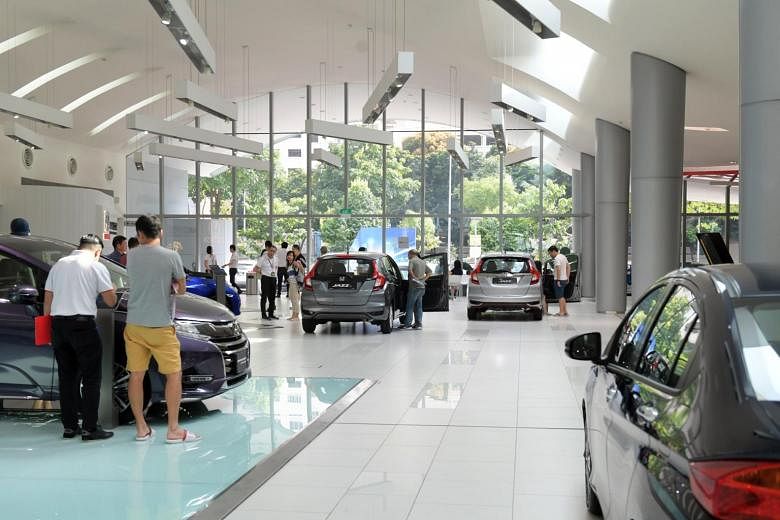In April 2014, when I was managing Sime Darby Motors' operations here and in Vietnam, we held a symposium titled Evolve Or Die.
The goal was to get our management team to challenge established norms and explore disruptive solutions - no matter how crazy they seem. We devised "doomsday" scenarios based on issues I thought could happen in the next five years.
One of them was that people stopped coming to showrooms and workshops. Most of the participants felt that would never happen - at least not in their lifetime.
Yet, here we are today. Car showrooms are shut during circuit breaker and will remain closed even after June 1. Workshops, which are allowed to tend to only emergency cases during circuit breaker, will reopen.
As we battle the socio-economic fallout, the post-Covid-19 world actually presents significant opportunities for growth.
This pandemic has forced us to hit the reset button and it would be a shame if we let these opportunities pass.
There are three what I call "Business Unusual" imperatives, which can serve as a roadmap to post-Covid-19 recovery for the industry.
A MARKET LIKE NO OTHER
To develop a post-pandemic business framework, we must first understand what the biggest impediments to change are.
The certificate of entitlement (COE) system, implemented in 1990, was designed to control the vehicle population and has done its job well. But it has one side effect: The more demand exceeds supply, the higher profits climb.
Carmakers quickly noticed this and swooped in for a larger slice of the pie. The biggest brands set up regional operations here and took over the role of the local distributor (basically to claw back operating margins).
They also took advantage of Singapore's world trade obligations and imported cars at a preferential import price (via transfer pricing). This is why some brands have low open market values relative to their retail prices.
Since many carmakers' regional headquarters were here, it became the responsibility of their local dealers to build facilities to serve as regional showcases. Automotive facilities kept growing in stature and size.
Post-Covid-19, this may not be sustainable, especially when electrification, autonomous driving, ride-sharing and other innovations can further threaten a market with diminishing margins. Hence, a post-pandemic review must begin with the issue of high operating costs.
KEEP THE GRAVY TRAIN RUNNING
The car industry relies almost exclusively on sustained showroom traffic and workshop visits to cover its overheads. This gravy train must keep chugging along.
The first order of business is to figure out how the aftersales department will continue to operate post-pandemic, given that a large part of a dealer's operating overheads is covered by aftersales profits.
Industry-wide Personal Protection Protocols (PPP) - that is, the cleaning and sanitising of a vehicle before and after every service station visited - have to be implemented to protect customers and service providers.
Taking a leaf from the healthcare sector, which has excellent practices, PPP must be strictly enforced by senior management. Firms that can guarantee high cleanliness and care standards are likely to score major points with consumers.
The second aftersales priority is to offer online pick-up and delivery services.
The palaces we have built for our brands have blinded us to a simple fact: People generally dislike taking their cars in for servicing. No amount of coffee, snacks and soothing music will change that.
With Covid-19, waiting at service receptions is unlikely to continue. This will force dealers to finally put in place processes that will actually meet customers' needs.
Maintaining sales revenue is infinitely more challenging.
Will customers return to showrooms, where the virus can potentially live for days on many surfaces? Can test-drives be truly safe?
The rigorous enforcement of PPP goes a long way towards addressing safety concerns, but it will be foolish not to expect some drop-off in showroom traffic. Given that most deals are struck in showrooms, that could be a major problem for sales.
Online sales and marketing here have never caught on in the past. Buyers love to bargain and you cannot do that online. Dealers may also be resistant, given that millions had already been sunk into brick-and-mortar infrastructure.
But in these times, online may be the only way to go.
Virtual product presentation, concierge delivery and pick-up of test-drive cars to customers' homes, and video calls to work out deals will become the norm.
SCALE UP PERSONALISED SERVICE
A car dealer's key performance indicators tend to focus on quantitative goals. Areas like customer satisfaction and engagement are generally not a dealer's strengths.
When I was running car distributorships and dealerships, I always made it a point to catch up with my customers at the service reception and it frustrated me that close to 70 per cent of them struggled to recall the names of their sales consultants and service advisers.
Post-Covid-19, dealerships must quickly elevate their employees to the role of "online growth generators" and proactively engage customers. This is a step up from their current role as mere order takers.
TIME FOR CHANGE
Before the pandemic, the prevailing management mantra in the industry may have been "if it ain't broke, why fix it?".
Post-Covid-19, dealerships must not only embrace change, but also encourage it within their organisation.
Some of my "Business Unusual" suggestions would possibly have already been implemented before the pandemic - if not for strong opposition from the status quo.
It would be a shame if this insular mindset were to persist in a post-Covid-19 world.
• The writer has 23 years of experience in the motor trade and was managing director of Sime Darby Motors operations in Singapore, Vietnam and Taiwan.

